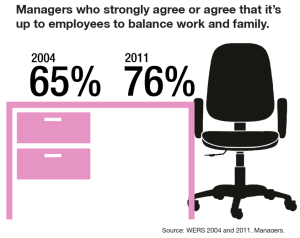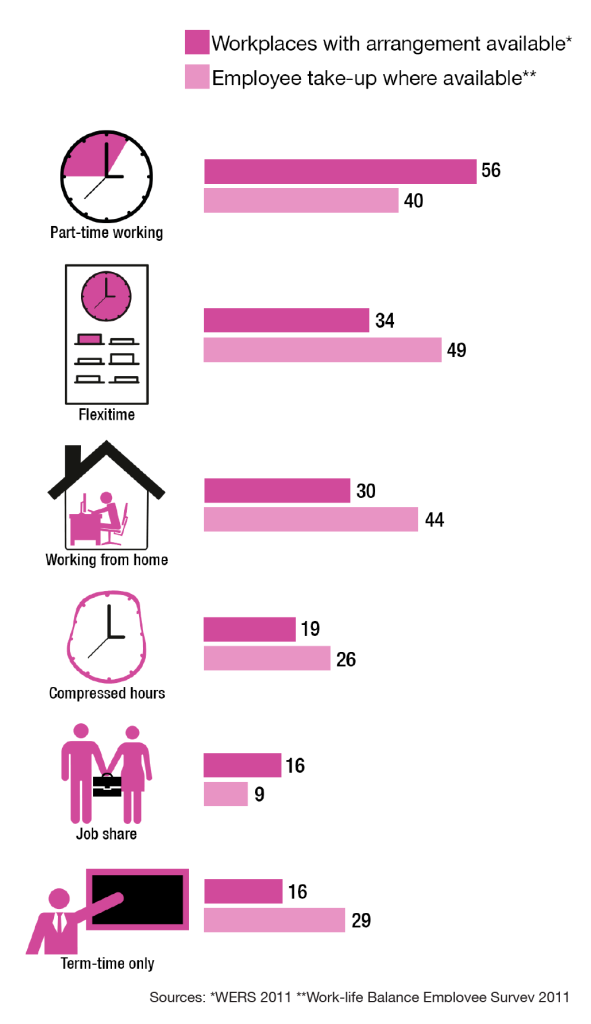Federica di Lascio writes: NATCEN [the National Centre for Social Research, UK] recently held a panel focusing on the relationship between flexible working and work-life balance. It was chaired by Dalia Ben-Galim, Associate Director of IPPR.
Starting from some recent research (Workplace Employment Relation Study, 2011), and comparing them with older ones (The Time of our Lives; 2003, 2008), the panelists agreed that there is actually a strong business case for flexible working, even though it is still considered simply a staff benefit.
The speakers underlined the reality of the new workplace – looking at global competition (with businesses facing increasing demands for flexibility and efficiency), the changing labour market, the changing size and structure of businesses, and also the changing needs of staff, such as looking after older relatives as we become an aging society.
According to research, the majority of UK managers would consider the possibility of introducing flexible working arrangements (part-time, compressed hours, working at home, etc.), but the risk they fear – a decrease in productivity – looms lager than the advantages. Indeed there are now more employers who believe it is solely up to the employee to balance home and work than there were in 2004

Nevertheless, especially for women – who still bear the greatest responsibility for caring for children and elderly relatives – flexible working would enable them to combine a professional career, productivity and social care.
But as panelists noted, a major problem is the lack of welfare security for flexible workers. This tends to mean that flexible options that result in reduced hours are less popular than those that enable employees to craft a way of working that fits their lives (such as being able to work from home)

Ideally, priorities should reflect the aspirations and needs of everyone – from the bottom to the top, and should be built on the recognition of the changing business environment. There should be help made available to businesses, and information campaigns. Flexible working can be good for the economy, and for the wellbeing of workers. It is especially possible within small businesses, where the scale enables a more personal approach, providing potentially greater flexibility in considering workers as people and not mere numbers.
The challenge is to help employers understand the real advantages of flexible work, enabling their employees to craft a way of working that combines career and private needs – and overcoming employers’ fears of ‘certain loss’. And there is another challenge, too, the challenge at the State level to make law favourable, especially in guaranteeing welfare security to flexible workers. You can find more information from the seminar and about NatCen here. And here a short podcast with extracts from the seminar by clicking this link: Is there a business case for flexible working_edit3

The panel
Speakers at the seminar were Jenny Chanfreau (Senior Researcher at NatCen), Fiona Cannon (Director of Inclusion and Diversity at Lloyds Banking Group), Michael Mealing (Chair at Employment Policy Unit, Federation of Small Businesses) and Sarah Veale (Head at Equality and Employment Rights Department, TUC).


Pingback: Flexible working: An answer to the changing economy AND work/life balance? | Informal Blog for professionals Facility Management, nuestros Posts mas informales FM.
The key to motivating the workforce of tomorrow is in understanding the traits of the new generation workforce and adapting existing work methods to suit their requirements. This would prove to be in the interests of the organisation as it would attract a skilled and talented workforce, and also stem the attrition rate significantly bringing down overhead and operational costs. To read more: http://blog.arise.com/uk/clients/motivating-the-workforce-of-tomorrow/